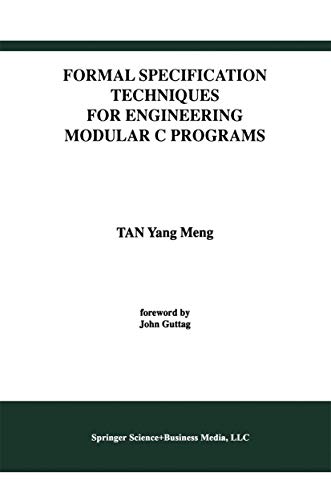Verwandte Artikel zu Formal Specification Techniques for Engineering Modular...
Formal Specification Techniques for Engineering Modular C Programs: 1 (International Series in Software Engineering) - Softcover

Inhaltsangabe
Software is difficult to develop, maintain, and reuse. Two factors that contribute to this difficulty are the lack of modular design and good program documentation. The first makes software changes more difficult to implement. The second makes programs more difficult to understand and to maintain.
Formal Specification Techniques for Engineering Modular C Programs describes a novel approach to promoting program modularity. The book presents a formal specification language that promotes software modularity through the use of abstract data types, even though the underlying programming language may not have such support. This language is structured to allow useful information to be extracted from a specification, which is then used to perform consistency checks between the specification and its implementation.
Formal Specification Techniques for Engineering Modular C Programs also describes a specification-driven, software re-engineering process model for improving existing programs. The aim of this process is to make existing programs easier to maintain and reuse while keeping their essential functionalities unchanged.
Audience: Suitable as a secondary text for graduate level courses in software engineering, and as a reference for researchers and practitioners in industry.
Die Inhaltsangabe kann sich auf eine andere Ausgabe dieses Titels beziehen.
Reseña del editor
Software is difficult to develop, maintain, and reuse. Two factors that contribute to this difficulty are the lack of modular design and good program documentation. The first makes software changes more difficult to implement. The second makes programs more difficult to understand and to maintain.
Formal Specification Techniques for Engineering Modular C Programs describes a novel approach to promoting program modularity. The book presents a formal specification language that promotes software modularity through the use of abstract data types, even though the underlying programming language may not have such support. This language is structured to allow useful information to be extracted from a specification, which is then used to perform consistency checks between the specification and its implementation.
Formal Specification Techniques for Engineering Modular C Programs also describes a specification-driven, software re-engineering process model for improving existing programs. The aim of this process is to make existing programs easier to maintain and reuse while keeping their essential functionalities unchanged.
Audience: Suitable as a secondary text for graduate level courses in software engineering, and as a reference for researchers and practitioners in industry.
„Über diesen Titel“ kann sich auf eine andere Ausgabe dieses Titels beziehen.
Neu kaufen
Diesen Artikel anzeigenEUR 13,72 für den Versand von Vereinigtes Königreich nach USA
Versandziele, Kosten & DauerSuchergebnisse für Formal Specification Techniques for Engineering Modular...
Formal Specification Techniques for Engineering Modular C Programs (International Series in Software Engineering)
Anbieter: Ria Christie Collections, Uxbridge, Vereinigtes Königreich
Zustand: New. In. Artikel-Nr. ria9781461368502_new
Anzahl: Mehr als 20 verfügbar
Formal Specification Techniques for Engineering Modular C Programs
Anbieter: AHA-BUCH GmbH, Einbeck, Deutschland
Taschenbuch. Zustand: Neu. Druck auf Anfrage Neuware - Printed after ordering - Software is difficult to develop, maintain, and reuse. Two factors that contribute to this difficulty are the lack of modular design and good program documentation. The first makes software changes more difficult to implement. The second makes programs more difficult to understand and to maintain. Formal Specification Techniques for Engineering Modular C Programs describes a novel approach to promoting program modularity. The book presents a formal specification language that promotes software modularity through the use of abstract data types, even though the underlying programming language may not have such support. This language is structured to allow useful information to be extracted from a specification, which is then used to perform consistency checks between the specification and its implementation. Formal Specification Techniques for Engineering Modular C Programs also describes a specification-driven, software re-engineering process model for improving existing programs. The aim of this process is to make existing programs easier to maintain and reuse while keeping their essential functionalities unchanged. Audience: Suitable as a secondary text for graduate level courses in software engineering, and as a reference for researchers and practitioners in industry. Artikel-Nr. 9781461368502
Anzahl: 1 verfügbar

